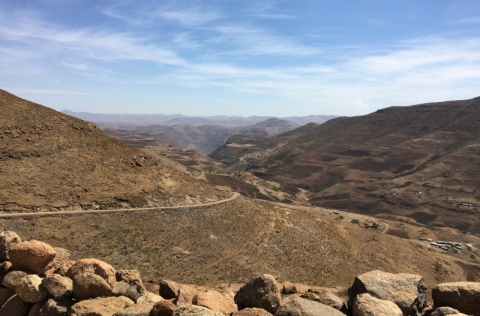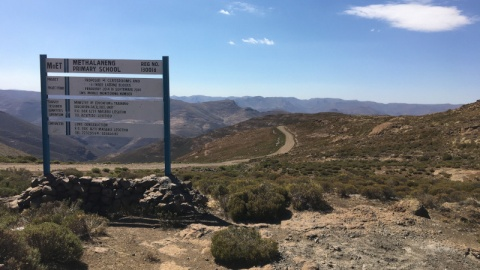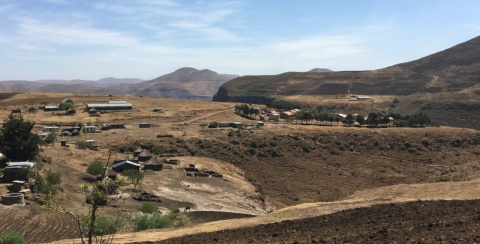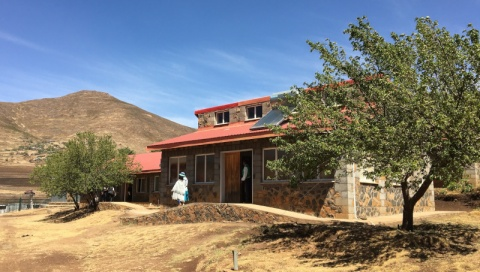Lesotho Teams Innovating After Bridge Collapses on Lone Road to Mountain Health Center

Community members helping PIH staff carry patients over a footbridge to reach facility that serves 8,500 people in isolated region
Posted March 11, 2021
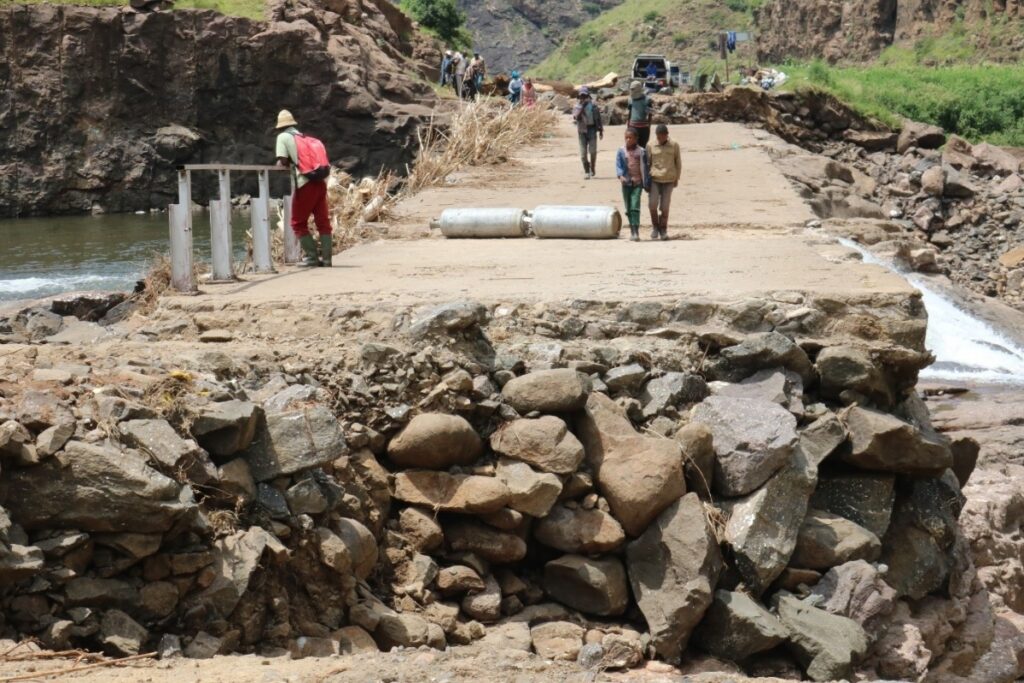
The collapse of a bridge on the lone road to an isolated health center high in the mountains of Lesotho has Partners In Health teams finding innovative ways to maintain care, including carrying patients on stretchers over a narrow footbridge—during rainy season, sometimes at night, and sometimes including pregnant women who need transportation to the district hospital.
“Finding people who are ready to carry patients from one side of the bridge to another side is a big problem. You cannot even imagine how all this happens at night,” said Bongiwe Baki, PIH site director for Methalaneng Health Center.
The road provides access to Methalaneng, which is one of seven isolated facilities that PIH supports through its Rural Initiative, a collaboration with Lesotho’s Ministry of Health to provide care in remote regions of the southern Africa nation. The bridge collapsed Jan. 27 after heavy rains near the town of Mants’onyane, one of 36 communities—totaling about 8,500 people—served by the health center.
Due to the heavy rains, the bridge crumbled in two places, on both sides, with no way to drive across. People have since been using a footbridge to cross, but the sudden lack of vehicle access has had shattering impacts on residents’ lives.
“At first I thought my eyes were playing tricks on me, because I was actually in a hurry,” said community member Lekhooa Lekhooa, who has offered his car for support during the crisis. “I stepped out of the car to take pictures because I wanted people to share this horror with me. The rains have really come down heavily, there is no denying it now.”
Bo-mphato Lits’ebeletsong tsa Bophelo, as PIH is known in Lesotho, provides integrated primary health care at its Rural Initiative sites, with services for HIV, maternal and child health, non-communicable diseases such as diabetes and hypertension, and much more. Screening and care for COVID-19 have been added over the past year. Carrying out those services in remote mountainous areas requires constant deliveries and supplies, from laboratory samples to medical equipment and support for emergency referrals to hospitals.
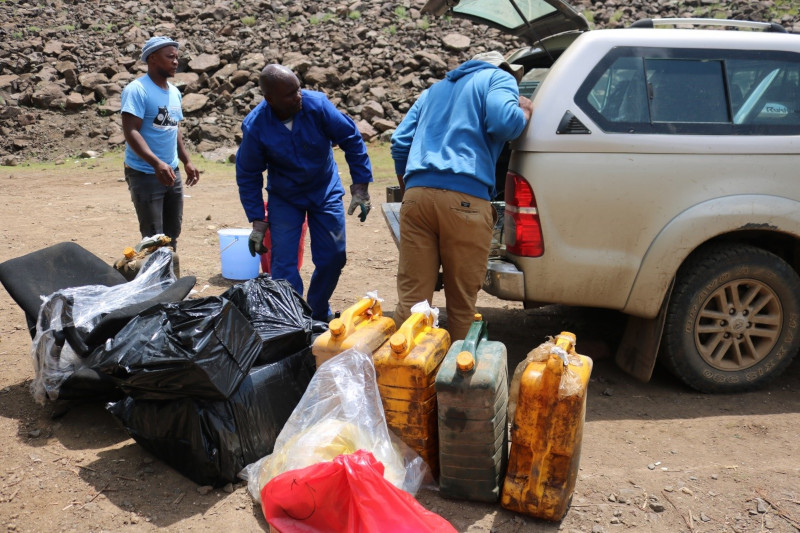
That means the washed-out bridge has had an outsized impact on PIH’s 38 staff members at Methalaneng.
Cars which those staff members use for referrals to the district hospital, including the ambulance, are now trapped at the health center, meaning patients must cross the bridge on foot to reach additional cars on the other side. For pregnant women as well as immobile patients who need to be carried on a stretcher, the challenge can be significant—so much so that PIH staff often work with helpful community members to ensure patients cross safely.
Crossings can be particularly challenging at night, when it’s harder to find community members willing to help and when rainy season—from November through February in Lesotho—can make conditions treacherous.
But in many ways, the same rains that washed out the bridge to Methalaneng could be a blessing across Lesotho, which just went through several years of severe drought. As is the cultural practice, many Basotho people prayed for rain in recent years—and those prayers began to pay off in 2020, which had solid rainfall. This year started even more wet, with rains falling across the country for the first six days of 2021.
Ideally, the heavy rains will translate into strong harvests for farmers, good grazing lands for cattle, and more water access nationally. And flooding during rainy seasons is neither unusual nor a surprise for Basotho people.
The Road to Methalaneng
In the heart of Lesotho’s isolated, elevated Thaba-Tseka District, the road to Methalaneng Health Center and the communities it serves will take you up, down, and around steep mountainsides.
In the photo of the central community, Methalaneng Health Center includes the red-roofed buildings in the background to the right, surrounded by a cluster of trees. One of the buildings is shown closer up, as a patient takes a moment outside. (Photos by Mike Lawrence / PIH)
Nonetheless, the temporary loss of the bridge at Methalaneng—with an uncertain timeline for repairs, given the remote location and rough terrain—has affected the entire region.
Lekhooa Lekhooa said his life has changed substantially since the bridge collapsed. One new challenge, for example, is gas. Cars trapped on the far side of the bridge, which now are used to take patients to the district hospital and transport residents in general, have to be careful with fuel without easy access to facilities near the health center and in town. Residents often roll containers for gas and diesel across the footbridge for refueling, and extra communication is required to coordinate those needs.
“The collapsing of this bridge has affected so much of our daily work,” said Mpho Molebaletsi, a PIH staff member at Methalaneng. “We now have to come up with funds to transport things like laboratory samples with the bridge out, which is an unforeseen expense.”
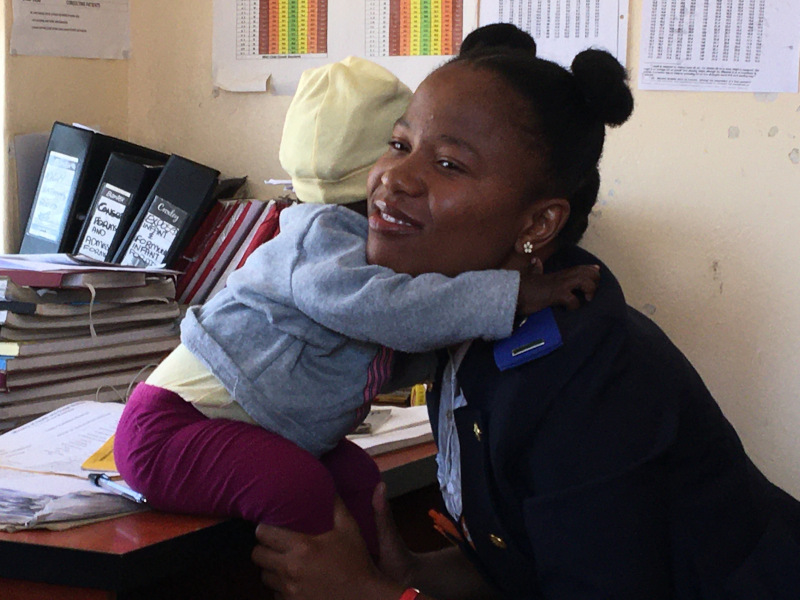
Article originally published on pih.org
See why PIH-Lesotho received a UN Award for their community-based COVID-19 program.
